Here’s what I like – and don’t like – about Vivek Ramaswamy on Israel, Iran & abortion after my exclusive interview
Here’s exactly what he told me – and what he’s told others – unfortunately, they don’t always match

JERUSALEM, ISRAEL – Vivek Ramaswamy is a smart, savvy, and very successful man.
But no matter how brilliant he’s been in business, he’s got a serious problem when it comes to politics.
He either hasn’t carefully thought through what he believes about foreign policy.
Or he’s letting himself become slippery.
He’s saying different things to different people while constantly claiming that he’s always “very consistent” and that he’s the only candidate in the race willing to “tell the truth.”
Nowhere are these troubles becoming more obvious – or more worrisome – than when it comes to his views on several matters of deep importance to Evangelical Christians – Israel, Iran, the broader Middle East and abortion.
On Monday, as I wrote in my column yesterday, I had the opportunity to sit down with Ramaswamy and interview him for 50 minutes.
Having been intrigued with Ramaswamy for several months – and impressed by his steady rise in the polls – I was very much looking forward to our conversation.
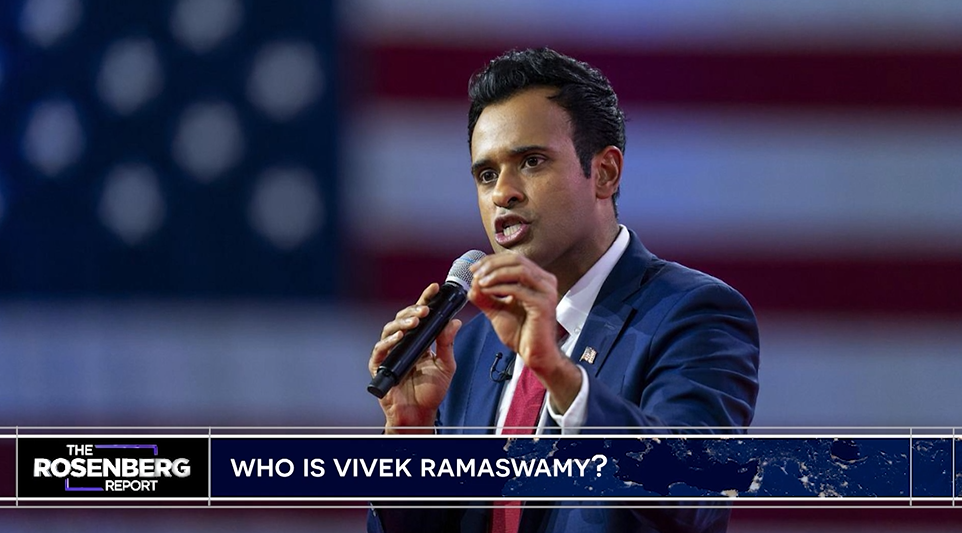
It was, after all, his first interview on TBN, the most-watched Christian TV network in the United States.
It was also his first long-form interview specifically dealing with his views on Israel and the Middle East.
You can watch the full episode from Sept. 7 by clicking here.
But coming away from the conversation, I became distinctly aware of the concerns that had been nagging me about him for some time.
Below, I am including the full transcript of the program so you can carefully study exactly what he told me – and what he has told others.
Unfortunately, you’re going to find out that they don’t exactly match.
HERE’S WHAT I LIKE ABOUT VIVEK RAMASWAMY
To be sure, there is a lot that I like about Vivek Ramaswamy.
His immigrant success story.
His rejection of woke-ism.
His commitment to stop the invasion across the Mexican border.
His declaration of war on the Deep State.
And his call for a 12% flat tax
… to name just a few.
HERE’S WHAT I DON’T LIKE
But I’ve got some real problems with him, as well.
In his heart, he wants to end military aid to Israel. That’s not fake news. That’s what he told the voter in New Hampshire. You just saw it. Sure, he’s backtracking now because that’s a deeply unpopular position. And I’m glad he’s listening to voters. But his core instincts were wrong.
I also don’t like that Vivek wants to develop a comprehensive strategy for disengagement from Israel and the Middle East. That’s dangerous.
And he’s not being clear and decisive about how he’ll stop Iran from getting The Bomb, telling local news outlet Israel Hayom he wouldn’t use military force, then telling me he would. That’s another problem.
What’s more, while I appreciate that he’s pro-life, I think he’s completely wrong in opposing federal legislation to protect the unborn.
Perhaps most concerning of all is the issue I raised at the beginning of this column.
Either Ramaswamy hasn’t carefully thought through his positions, or he’s not being honest with every audience about what he really believes.
A FEW THOUGHTS I’D LIKE TO SHARE WITH VIVEK RAMASWAMY
Vivek, my sense is that you’re a loving husband, a devoted father, devoted to your Hindu faith, and careful to honor and cherish your family’s heritage of coming from India to start a new life in America.
Clearly, you’re super smart and a genius in the business world.
So, I hope that you’ll pause for a moment and do some soul-searching.
I hope that you’ll think very carefully about who you really are at your core – and what you want to be known for.
Your campaign motto is, “TRUTH.”
You wear a baseball cap with the word emblazoned on it.
You stand before big posters with the word in huge letters.
Good – so tell us the truth, Vivek.
Don’t let yourself become a politician by saying different things to different people.
And be honest about your position on Israel.
If you really want to end all U.S. military aid by 2028, just own it.
If you really want to disengage from Israel and the Middle East, own that, too.
You’ll be criticized for those positions, including by me.
But at least you’ll be known for being honest, for speaking your mind.
Right now, the slipperiness is not attractive – and it’s going to catch up with you.
That said, if you’ve re-thought your positions and want to change what you’ve said in the past, fine – but own that, too.
Level with people.
Tell us you’ve changed your views, and tell us why.
You’re always saying – including to me – that you’re not a “typical politician” – so please don’t become one.
I say that not as an enemy but as a friend.
While I have no interest in endorsing any candidate in this race, I do want to create a safe place for every candidate to come onto THE ROSENBERG REPORT and make their case, so long as they are willing to be pressed – even challenged – on their views.
It’s not a game of “gotcha” for me.
It’s an opportunity to give my audience the chance to get to know the candidates in a fair and honest way so they can pray faithfully and make well-informed choices when it’s time to vote.
I hope you’ll accept this unsolicited advice in the spirit in which it’s intended.
And that you’ll feel welcome to come back on the show in the future.
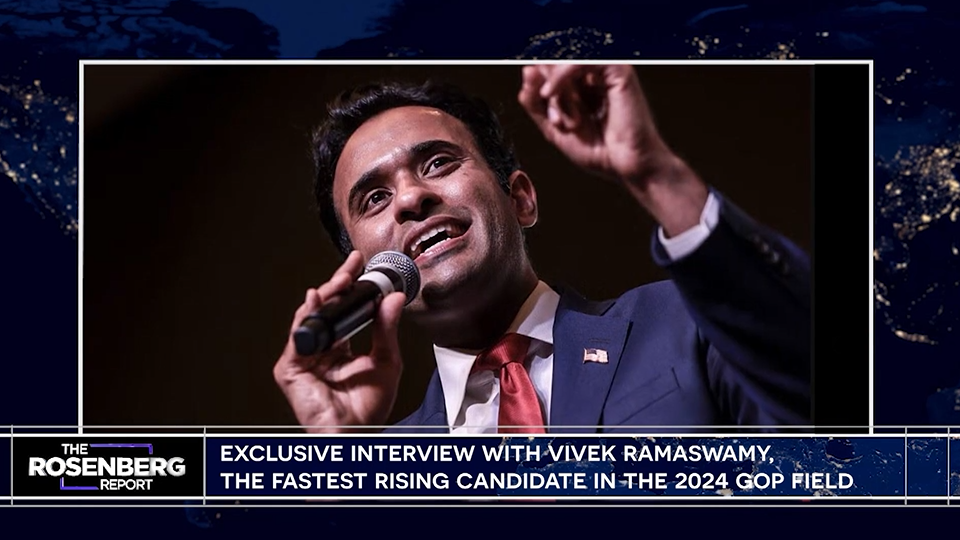
Here is a full transcript of the show, which aired at 9 p.m. EST on TBN.
OPENING TEASER
Tonight, on THE ROSENBERG REPORT – when the campaign began, few people had ever heard of him.
Now, he’s rising in the polls and creating enormous controversy over his positions on Israel, Ukraine, Taiwan, and abortion, just to name a few.
So, who is Vivek Ramaswamy? What does he believe? Why does this devout Hindu believe he can persuade Evangelicals to vote for him? Is it true that he wants to end all U.S. military aid to Israel and that he refuses to use the U.S. military to stop Iran from getting The Bomb if all else fails?
Part 1 of my exclusive interview with the fastest rising candidate in the field, tonight, on THE ROSENBERG REPORT.
A BLOCK
Good evening and welcome to THE ROSENBERG REPORT.
Tonight, an exclusive interview with a presidential candidate who has made a lot of news and a lot of controversy when it comes to Israel and the Middle East.
His name is Vivek Ramaswamy – 38 years old, a multimillionaire who has created multiple billion-dollar companies, the youngest person ever to run for president in any of the major political parties, and he’s moving up significantly. He started at zero in the polls, climbing to around 7.5% in national polls.
He’s drawing a lot of attention but a lot of controversy, as well.
Take a look at this dustup between Vivek Ramaswamy and former Ambassador to the UN Nikki Haley in the recent Republican debate.
SHOW CLIP from the first GOP debate as Haley blasts Ramaswamy for his views on Russia, Ukraine, Taiwan and Israel, saying, “You have no foreign policy experience, and it shows.”
ROSENBERG: Vivek, welcome to THE ROSENBERG REPORT, and TBN, the most-watched Christian television network in the United States. We're so honored to have you on. Welcome.
VIVEK RAMASWAMY: It's good to be on, Joel. How are you?
ROSENBERG: I'm doing well. You have come out of nowhere. Really. So, let's just start with the big picture. Why are you resonating with so many people in the United States and particularly in the Republican party?
RAMASWAMY: So, look, for a long time, I think the Republican party has been running something – the Left's vision of race, gender, sexuality, climate. And I've been part of that, to be honest with you. I've written about running from it. You know, I wrote, Woke, Inc. I wrote, Nation of Victims. So, I have been guilty of that sin of just running from something. But now I think it is our moment to level up. And that's what I'm doing in this campaign, to start leading us to something, to an affirmative vision of our own. So, if they're talking about race, gender, sexuality, and climate, I want us talking more about the value of each individual, the family, the nation, God, talking about what it means to be an American today, reviving our missing national identity at a moment where we're going through a national identity crisis. That's the real root cause of our country's failure right now. Faith, patriotism, hard work, family – all disappearing at the same time. That leaves a moral vacuum in its wake. And I think one of the things that I'm doing, uniquely, amongst politicians – maybe it's because I'm not a politician – is that I'm offering an actual vision of what we stand for. And I think that has propelled our success in this campaign so far.
ROSENBERG: I think it has. One of the many interviews that I've been tracking with you on was your long-form interview with Jordan Peterson on his podcast. And I think you guys went really in-depth over the summer on stuff. I think it was your second time with Jordan. It was a fascinating conversation. And one of the benefits of doing a little bit longer form than just, you know, a one-minute, a two-minute soundbite, and I'm glad you're on for the whole for our whole show.
One of things that I love about you, and what’s cut through to me here in Jerusalem, of all places – and one of my sons, who is particularly tracking with you, he's not committing, he's just like, “Okay, I'm really I'm tracking this for one of my first presidential debates, or campaigns” – is the anti-woke case that you're making and how devastating that is and how incompatible it is with the classic Judeo-Christian values of the United States. Certainly, your war on the Deep State has caught his attention. Your tough stand on the Mexican border and that invasion of 7 million people over the last four years has caught my attention. So, I would love to talk about all those, except that I agree with you on those things. So, I want to – and I agree with you, I think, on some of these things we're going to talk about, but I need clarity. And I think a lot of Evangelical Christians do. Let's start with your vision of a culture of life. Just start with how you see the unborn from your value system.
RAMASWAMY: Unborn life is life. That's a heart truth. And I picked that up, actually, that one at a relatively young age. I was 16 years old and in the third year at St. Xavier High School when I was persuaded of that and it struck me, it stuck with me ever since. It's been part of my value set and the value system we raise our two children in as well. And I say that pro-life means womb to tomb.
One of the things that I did that I'm most proud of in my career was working on what's now an FDA-approved therapy that the rest of the pharmaceutical industry had abandoned, had turned its back on, where there's just 20 kids a year born with a genetic disease where 100% of them die by the age of three. I worked on a therapy where the majority of those kids are able to now live lives of normal duration, if treated. So, my pro-life philosophy starts at conception and goes all the way through finality of life as well. I think that most Americans actually share this value set in common. If we start talking openly about it.
One of the things that I often say to persuade friends on the other side – and I've succeeded, I may say, in persuading some of them and bringing them along – is, you take the example that Clarence Thomas raised during the case of a pregnant woman who's walking down the street. She's assaulted. The unborn child dies as a result. You find me one person in the United States who tells me that that unborn child wasn't alive, if that criminal doesn't get full liability for that death. I haven't found one yet. Everyone agrees that criminal deserves liability. And so, one of the things I'm doing is appealing to, I think, the basic truth of the matter, to say this isn't about men's rights or women's rights, it's about human rights.
And for our part, I'm okay with in fact, I'm in favor of pro-adoption policies, pro-child care policies, even policies that attach greater sexual responsibility to men. As a man, I'm willing to stand for that because we have genetic paternity tests that are 100% reliable. But this isn't about women's rights or men's rights. It's about human rights. Viewed as such, I think I can actually help be a leader in our movement to revive that culture of life in the United States.
ROSENBERG: I appreciate that. So, clarify your position. I mean, I think it's clear, but I just want you to share it and explain it. So, you don't support, however – if I understand correctly from various quotes that you've given – that you don't support a federal law, any federal legislation on this, you know, Lindsey Graham's 15-week ban or whatever. Why not, if these are human lives?
RAMASWAMY: Yeah, I think he’s wrong on that, and I'll tell you why. Right. so, there's a couple of reasons. So, I am pro-life. I believe abortion is murder. That is my value system. Other people may disagree with that. That's how I view it.
ROSENBERG: Amen.
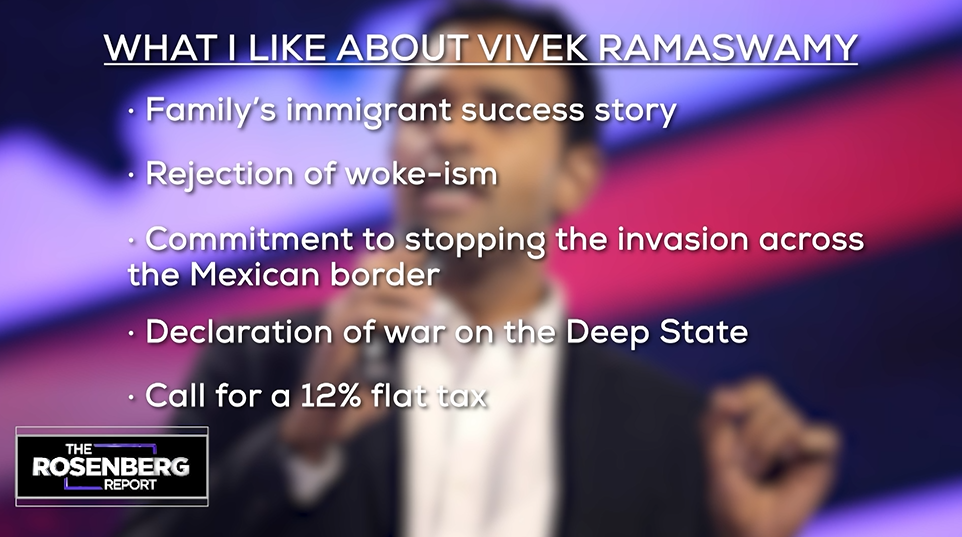
RAMASWAMY: I'm also a strong constitutionalist. All of our murder laws are at the state level because of this thing called the 10th Amendment in the Constitution.
ROSENBERG: No, there's a lot of murder laws that are actually federal.
RAMASWAMY: Well, I think that those involve crossing state lines and a bunch of other jurisdictional hooks. But classic murder laws, person A kills person B. That's a state law. And so, on constitutional grounds, what I have said – just to be very clear about my position – is I am open to being persuaded by constitutional scholar, and I'm talking to many across the spectrum, I've talked to many across the spectrum, to tell me what is the jurisdictional hook in the Constitution that says the federal government can regulate this. I'm more than persuaded that we need to defund Planned Parenthood, which the federal taxpayers are absolutely funding. We'll put an end to that. But in favor of a federal abortion ban. I don't yet see what part of the Constitution allows us.
ROSENBERG: Not even the 14th Amendment?
VIVEK RAMASWAMY: So, the 14th Amendment is the strongest possible case. But if you take an originalist understanding of the 14th Amendment, there was no sense in which that was included in it. It could also apply to other forms of life that you could make that same two-sided argument on. So, I'm ardently pro-life. But here's the other reason, and I think this is really important. I believe this firmly, and there's other good pro-life people in the U.S. Senate and onward who have talked about this issue. I believe in getting the best arguments for all sides, and I think that there's many good people on the same side of this issue with me. I think more unborn children will die in the next 30 years if we do federalize this issue now. The reason why is Joe Biden and the Democratic party are trying to push through a federal piece of legislation to codify Roe v. Wade into law. And we don't want a game of ping pong on this. What we want is to drive this through the states where we have a winning hand. Look at what happened in Iowa. I went there to celebrate it recently, the six-week legislation. I went there to say, look, this isn't a destination. This is a step along the way, but this is how the system is supposed to work. That’s how we’re going to be most successful over the long run.
ROSENBERG: All right. I appreciate that you're candid about it. You're consistent about it. I think you're going to have, you know, some problems with Evangelicals who think at least a 15-week ban probably has 60, 70% support. But you're direct about it.
COMING UP NEXT
Coming up next on THE ROSENBERG REPORT, did rising GOP presidential candidate Vivek Ramaswamy really tell voters he wants to end all U.S. military aid to Israel by 2028? And did he really just tell Israel’s largest daily paper he would NOT use military force to stop Iran from getting The Bomb if diplomacy doesn’t work? Don’t go away. I’ve got the answers next on THE ROSENBERG REPORT.
B BLOCK
ROSENBERG: Let's talk about a couple of other major issues that Evangelicals care very, very deeply about. Certainly Israel, but also the threat from Iran. Let's start actually with Iran. How do you see the magnitude of the Iranian nuclear threat and terror threat?
RAMASWAMY: I think it's significant. And I think that we have an Ayatollah Khamenei who has been hostile not only to Israel's continued existence, which is, of course, a problem, but is also hostile to the United States of America, which is my job as the U.S. president, to look after, as well. A lot of the long-range missile technologies they're working on, they don't need that to hit Israel, they need that to hit the United States.
ROSENBERG: Right. Right.
RAMASWAMY: And so, I think this is a serious threat. So, I've been very consistent on this. I believe that we need to absolutely ensure that Iran never, ever becomes nuclear-armed, or anywhere close to it, not because that's a vital interest for any other country than the United States of America. But it so happens that Israel also shares that national interest in common.
ROSENBERG: And the Arab world, as well.
RAMASWAMY: Yeah, I mean, much of the Arab world. But I think that among reliable partners in the Arab world, let's get real, Israel is the partner in the Arab world that we can actually rely on rather than to stab us in the back. And so, you know, I think that other Arab partners are also important, but they have other ties to China, to other countries, I think that can compromise, I think, their reliability as partners for the United States. But when it comes to the U.S.-Israel relationship, that is probably one of the most important shared objectives that we care about, that we can work together to ensure that Iran never, ever, ever becomes nuclear armed with a nuclear weapon. I think that’s an obvious vital interest.
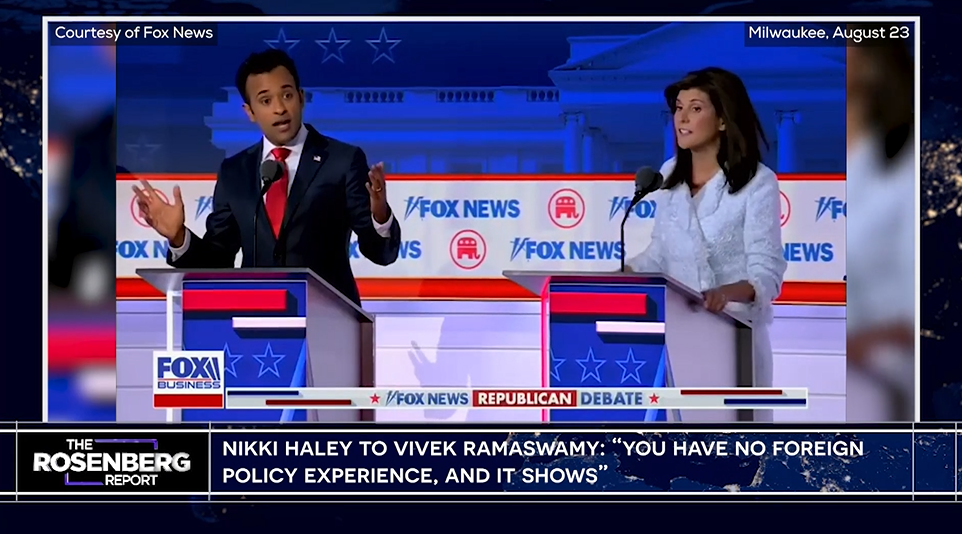
ROSENBERG: Okay. So, you're going to resonate with a lot of Evangelical Christians, as well as a lot of Americans on that. But how would you deal with it? Because as I've watched various interviews with you – including with Israel Hayom, Israel's biggest newspaper the other day – you actually took the military option completely off the table, the U.S. option.
RAMASWAMY: Actually, that's not what I – that's not accurate. But I will tell you what I did take off the table. I did take U.S. troops off the table. So, one of the things that's – and Joel, I think you probably understand this about me, and I just think it's important people understand this about me is I'm not a traditional politician. I don't play the political games, reading from the binders handed on the talking points of how you're supposed to read. But the flip side of that is what I tell you, I think is much more authentically my own conviction. I believe in clarity over ambiguity, and I think that does ruffle some feathers. It lends itself to opposition research misquoting you. But that's okay. That's the way I do things. I think that's actually going to make the U.S.-Israel relationship far stronger by the end of my first term than it has ever been because I will treat it as a true friendship, not just some sort of transactional relationship.
One of the things I love about Bibi is he's a straight talker. I'm sure he and I will get along. I'm sure I'm going to have him over to the White House in a way that Biden didn't. And I'm sure I'm going to go see him in Israel, as well. But that's the kind of relationship I want to have, real authentic.
ROSENBERG: So, let me clarify.
RAMASWAMY: I’ll be happy to clarify.
ROSENBERG: What you mean is, “I don't want to use men and women” – like what, you mean boots on the ground? You don't want to invade like Iraq? Because….
RAMASWAMY: Yes. Yes. That's exactly right.
ROSENBERG: Because you left the impression – you know, I watched on video, and I read the transcript….
VIVEK RAMASWAMY: The headline left the impression, but….
ROSENBERG: No, no, I watched the whole video of the interview and you left me with the impression – someone who is, you know, I'm not going to take a position, I’m not endorsing any candidate, but I’m positive towards you – that you wouldn't use force and, meaning airstrikes or whatever, that is the impression you left here in Israel.
SHOW CLIP from Israel Hayom video – start as interview asks, “Would you use military force to stop Iran?”.
RAMASWAMY SOUNDBITE: “We will not stop Israel from defending itself to the fullest capacity. And we remain supportive of Israel because they are our friend. I think it’s really important that the U.S. not put our own men and women on the line in a war with Iran when, in fact, there is no reason for us to be in that kind of war, and I don’t think that’s good for the United States and I don’t that’s good for Israel….So, Israel needs to be in a strong position to defend itself and the United States will be at Israel’s back. But I think that that’s a very different thing from automatically sleep-walking ourselves into war. I’m an anti-war President and the way I’m going to do it is by deterring war, be it ending the war in Ukraine, be it deterring China. These are important elements of why I think it’s important to be strong, but in a way that doesn’t accidentally walk us into wars that we don’t belong in.
RAMASWAMY: No, no, that’s definitely wrong.
ROSENBERG: Okay, well, why don’t you clarify?
RAMASWAMY: And if that’s a misimpression then we should be absolutely clear.
ROSENBERG: Because it’s important.
RAMASWAMY: You can look at what I've written. Absolutely. And you can look at what I've written in multiple forums as well in writing, and it's consistent with this. I have said that we will fully defend Israel against Iran, including militarily. That's in writing, in multiple forums that I've actually put out there. But I've also been clear – and I think it's important to be clear – that doesn't mean putting boots on the ground, sending our men and women to die as they did in places like Iraq, that’s…..
ROSENBERG: Okay, well, that's an important distinction.
RAMASWAMY: ….that’s worse for the United States and worse for Israel. And Joel, I think you understand this. I think your audience understands this, as well. Most people in Israel who are in favor of the U.S.-Israel relationship – most pro-Israeli advocates in the United States have long said, and I appreciate the honesty of it – that Americans should not have boots on the ground who put themselves in harm's way to fight a war for Israel. That's always been the tenor, because that allows us to be honest, to say we should go to the fullest extent of supporting Israel outside of that boundary.
ROSENBERG: Absolutely.
RAMASWAMY: So, I believe in staying consistent with that. And I think that a lot of good politicians, part of their worldview is that you don't want to be overly clear about your foreign policy. And they're coming from a good place with that. I actually view it differently. And it's not just on Israel-related foreign policy. This applies to my views in other areas of foreign policy, as well. I think clarity and honesty and clear red lines and clear hard commitments are actually good because it allows our partners to trust us more deeply and it allows our enemies to take our redlines that much more seriously. So, my general philosophy, I depart from the neoconservatism of the last 25 years, to realism in our foreign policy. And I think that will keep both the United States and our partners around the world that much more secure.
ROSENBERG: There is, though, another statement that you're making that causes people to think, all right, he's really not willing – if we get to the last possible moment and nothing else will work – to stop Iran from getting The Bomb….
COMING UP NEXT
Coming up next on THE ROSENBERG REPORT, what else has presidential candidate Vivek Ramaswamy said to make Americans and Israelis worry he isn’t serious about stopping Iran from getting The Bomb? And is really planning to end all American military aid to Israel by 2028? I press him for answers after the break – stay tuned to THE ROSENBERG REPORT right here on TBN.
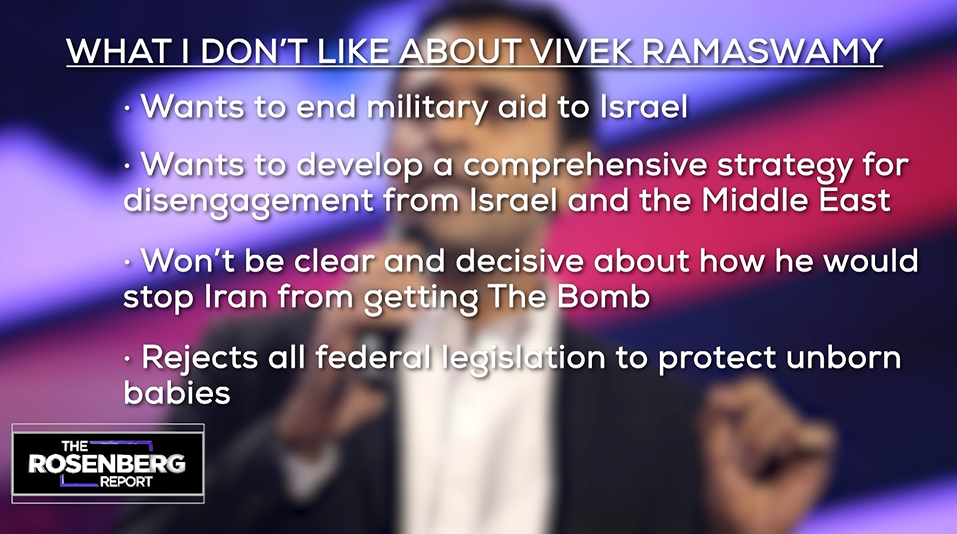
C BLOCK
ROSENBERG: There is, though, another statement that you're making that causes people to think, all right, he's really not willing – if we get to the last possible moment and nothing else will work – to stop Iran from getting the Bomb. Because you're saying everywhere, “The only war that I would set in motion is against the Deep State, the administrative state,” which, by the way, God bless you for that. But when you say that in the combination with maybe lack of clarity – the risk is, look, the United States with our technology and weaponry could do in -- I don't you know, days, weeks, maybe a month – far more damage to that nuclear program, right, than Israel. So, you look like, you sound like, you're taking that off the table, and….
RAMASWAMY: No, I’m not, but I appreciate you pressing me on this.
ROSENBERG: And you've also mentioned, you talk about a “broader disengagement strategy from the Middle East.” So, those are reasons why we're trying to get clarity on where you're really coming from.
RAMASWAMY: Sure. Yeah, and I like long-form settings, and I've been clear and I'll continue to be clear about exactly where I am. These are great discussions, Joel. So, I think the top objective in Year One as it relates to Middle Eastern policy is to consummate Abraham Accords 2.0. I think that was one of the signature achievements of the Trump administration. I think one of the most anti-Semitic elements of Western foreign policy has been to hold Israel hostage over the Palestinian question, when in fact, that has held Israel back unnecessarily, integrating Israel back into the security and economic infrastructure. But in reality, those are the less important of the nations that are part of the pact right now. It was a great first step. We need to diplomatically lead and use levers to get Saudi Arabia and Oman and Qatar and even outside the Middle East. Let's talk about Indonesia, getting them into that pact. That takes Israel and propels Israel forward to a new level…..
I want to take the Trump policies towards Israel but carry them forward to the next level. And I think I'm going to be able to do that because I bring a new generation, an authentic voice, and a realist vision of foreign policy to actually accomplish that. I'm staying true to commitments that have always been woven into the U.S.-Israel relationship, which is that we don't want U.S. boots on the ground for a variety of reasons. We don't need that….
ROSENBERG: So, let's talk about the dustup you had with Nikki Haley. But let's set aside hers, or Pence's, or anybody else, in what they were saying, because I did go back and watch all of the interviews, starting with a conversation you had in New Hampshire with a voter later with Russell Brand. That was a very interesting ad extended, sending a DVD version, as it were. But you did say several things. And I think you’ve clarified it, but I want you to do it on the show. Okay? So, you've used several phrases. One is that you hope to get to the point in 2028 where Israel doesn't need a dime – or a shekel, we might say – of American military investment. That has rattled people. So, I want you to talk about that.
RAMASWAMY: It has.
ROSENBERG: But I also want to say, I heard several times in your description of it is you wouldn't do that as a “one-off” – but you see it as part of a “comprehensive disengagement strategy from the Middle East” that we need to understand what you mean by that
RAMASWAMY: Absolutely. Yeah. And this is a great conversation. So, what I've said is – and this is one of the reasons I love Bibi, by the way, as a counterpart in Israel – is that we're never going to cut off aid just to state the obvious. Let's just get the table stakes on there. And I've said this in countless forums, too, Joel, “We're not going to cut off our aid to Israel until Israel tells us that they are ready for it and that they actually are not only fine with it, that they're fully ready for it.” We'll see when and if that day comes.
One of the things about Bibi that I love is that he is a leader of Israel who has said this in the past. You look at in the mid-1990s. He has actually been a leader who has said it, which is why I respect him. This is what true friends do. They're real with each other. They're authentic. They don't go through the scripts of diplomatic talking points. And so that's the kind of real relationship I want to have with Bibi, with the Israeli people, with the Israeli government, just as I've had with my Israeli business partners in prior phases of my life as well. And so, I just think that's going to put us at our strongest…
I'm not going to cut off Israel in a vacuum. But what we actually want to do is make sure that we have a comprehensive vision for the Middle East to be a peaceful place. And I'm thinking not in the 3- to 4-year time horizon. I'm thinking on the time horizons of history, over decades here, really being a visionary for where we can take this. The current Ayatollah and others, we don't have to take that for granted. We think about a 50-year time horizon of what's possible in the Middle East. And yes, do I aspire and yearn for a future where Israel is so fully integrated to the economic and security infrastructure of the rest of the Middle East that there's a relationship of mutual respect that we have finally recognized that, yes, there is a land here that is going to remain a land for all of eternity, that belongs to, correctly, rightfully, the people whose land it was, the Jewish people in the Jewish state, that is Israel. Yes, I think that would be a great thing to aspire towards over the long run.
ROSENBERG: What a fascinating conversation with Vivek Ramaswamy. Third in most polls, but creeping up towards second in some national polls. You heard me ask him very direct questions on a number of critical issues – abortion, Israel, Iran, his general foreign policy views, and his talk about disengaging from the Middle East, which I'm not a fan of.
Take a look at this clip of Vivek talking with a voter in June in New Hampshire who asks him specifically if he will stop giving Israel aid should he become president.
SHOW CLIP of conversation with a voter in New Hampshire in June 2023.
VIVEK RAMASWAMY SOUNDBITE: “I think that would have to be part of a broader disengagement with the Middle East. So, I would not do that as an isolated policy. I would do it as part of also making sure that we're not leaving other people we've also propped up, from Saudi Arabia to even Iran, in other ways over the years. It has got to be part of a comprehensive strategy….It has to be part of a broader, comprehensive strategy vision for disengagement. That I do support.”
ROSENBERG: So, here’s the thing.
There’s a lot that I like about Vivek Ramaswamy.
His immigrant success story.
His rejection of woke-ism.
His commitment to stop the invasion across the Mexican border.
His declaration of war on the Deep State.
And his call for a 12% flat tax, to name a few.
But here’s what I don’t like.
In his heart, he wants to end military aid to Israel. That’s not fake news. That’s what he told the voter in New Hampshire. You just saw it. Sure, he’s backtracking now because that’s a deeply unpopular position. And I’m glad he’s listening to voters. But his core instincts were wrong.
I also don’t like that Vivek wants to develop a comprehensive strategy for disengagement from Israel and the Middle East. That’s dangerous.
And he’s not being clear and decisive about how he’ll stop Iran from getting The Bomb, telling Israel Hayom he wouldn’t use military force, then telling me he would. That’s another problem.
What’s more, while I appreciate that he’s pro-life, I think he’s completely wrong on opposing federal legislation to protect the unborn.
I’ll just tell you right now, none of these things are going to play well with Evangelical Christians.
That said, I give him credit for coming on THE ROSENBERG REPORT.
And don’t forget, this is only Part 1 of our exclusive conversation, his longest and most detailed yet on Israel, Iran, the Abraham Accords, and his broader vision of U.S. foreign policy.
Don’t miss Part 2 next week as I press Vivek on more of his most controversial statements.
But that’s our show for this week. I hope you found it helpful.
I encourage you to share the link to this show on social media so your friends and family can learn more about Vivek Ramaswamy, whether they like him or not. You can find all that at www.RosenbergReport.TV.
I also encourage you to go to our YouTube channel and subscribe. We've got a new YouTube exclusive on my assessment of where we are with the prospect of a Saudi-Israeli normalization deal. I go into some depth on that. I hope you'll take a look at that YouTube exclusive.
Well, thank you so much for watching.
May God give you a great week with you and your family and friends and, Lord willing, I'll see you next week right here on THE ROSENBERG REPORT.

Joel C. Rosenberg is the editor-in-chief of ALL ISRAEL NEWS and ALL ARAB NEWS and the President and CEO of Near East Media. A New York Times best-selling author, Middle East analyst, and Evangelical leader, he lives in Jerusalem with his wife and sons.














